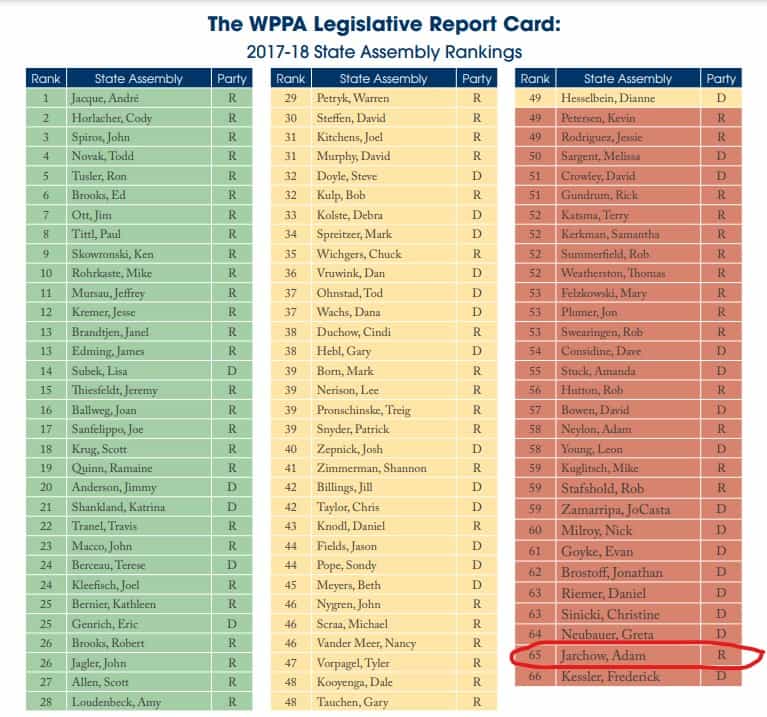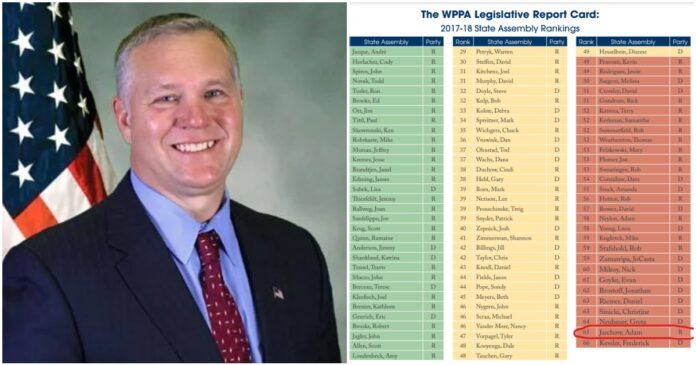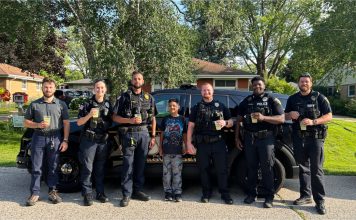Even radical anti-police and pro-BLM Democratic legislators like Jonathan Brostoff and David Bowen were ranked higher than Jarchow by the WPPA.
Attorney General candidate Adam Jarchow, who claims he’s pro-police, was ranked second last in the entire state Assembly in the Wisconsin Professional Police Association’s legislative scorecard
Even radical anti-police and pro-BLM Democratic legislators like Jonathan Brostoff and David Bowen were ranked higher than Jarchow by the WPPA, as were all Republicans. Jarchow served in the state Assembly, representing District 28, from 2015-2019.
Adam Jarchow WPPA Report Card

We decided to explore Jarchow’s history after receiving a sponsored ad from his campaign that proclaimed, “stop crime. Support police!”
It was a pattern for the first-term legislator.
In 2016, WPPA ranked Jarchow 90th out of 98 legislators in its legislative report card. You can read the bills that WPPA lobbied on here: 1027wppareport.

Jarchow’s Response
We asked Jarchow for comment.
He responded, “Law enforcement officers who know me best recognize how much I support our brave men and women in uniform, which is why Polk County Sheriff Brent Waak has said “[t]here has been no more vocal supporter of law enforcement than [Adam Jarchow],” but it is curious this group that endorses candidates like Tammy Baldwin places law enforcement champions like Congressman Tom Tiffany near the bottom of its 2018 rankings.”
The WPPA has made endorsements to politicians from both parties over the years, but endorsed Republicans Paul Ryan, Jim Sensenbrenner, and Sean Duffy during the earlier Jarchow ranking time frame. In addition, 28 of the top 31 Assembly members on the more recent scorecard are Republicans. The police association ranked every Republican higher than Jarchow in 2017-18.
WPPA is a major police association that serves “over 10,000 active and retired members from almost 300 locals…WPPA is recognized as the leading law enforcement association in the state and a strong voice at the national level,” according to its website.
The rankings look at whether legislators co-sponsored legislation the WPPA supported or opposed, offered amendments they supported, and studied their committee and floor and procedural votes. The WPPA works to “identify items of legislation that impact Wisconsin’s law enforcement community generally, and the WPPA’s membership specifically,” its website says.
Jarchow is running against Fond du Lac County District Attorney Eric Toney for the Republican nomination for Attorney General. On his website, Toney, the president-elect of the Wisconsin District Attorneys Association, highlights the fact he’s received by far the most law enforcement endorsements in the race, including “90 Sheriffs, District Attorneys, and Police Chiefs, and has been unanimously endorsed by the Wisconsin Fraternal Order of Police State Lodge, Milwaukee Police Association, Wisconsin Right to Life, and former Republican Party of Wisconsin Chair Brad Courtney.”
Jarchow has been endorsed by 6 current sheriffs (three of them dual endorsements). 3 retired sheriffs, and 13 police chiefs.
We have found votes and statements by Jarchow that aren’t pro-police or tough on crime. They include:
In 2015, Jarchow voted no to a bill that would make it a felony to batter or threaten a prosecutor or public defender or their families and to threaten a law enforcement officer or their families.
In an email blast after this story ran, Jarchow trashed Wisconsin Right Now and wrote, “They also attacked me for voting against a bill that I believed didn’t do enough to protect people who work in the criminal justice system. And actually attacking a law enforcement officer in Wisconsin was already a felony, the same as the proposed bill in question.”
However, that email leaves out most of what that bill did. It specifically added protections for prosecutors, public defenders and their families and police officers’ families into the law.
A 2017 bill required the Department of Corrections “to recommend revoking a person’s extended supervision, parole, or probation if the person is charged with a crime while on extended supervision, parole, or probation.” Jarchow voted no.
At times, Jarchow simply didn’t vote on public safety-oriented bills.
A bill to create “grant programs related to drug trafficking, evidence-based substance abuse prevention, juvenile and family treatment courts, and drug treatment for inmates of county jails. The bill creates two attorney positions in the Department of Justice to assist the division of criminal investigation in the field offices of Wausau and Appleton and to assist district attorneys in the prosecution of drug-related offenses. The bill also allows a court to order a person who is found guilty of a violation of the Uniform Controlled Substances Act to attend a victim impact panel or similar program as a part of his or her sentence.” Jarchow didn’t vote.
He also didn’t vote on a bill to create a state prosecutor’s office. He supported lowering the state’s drinking age to 19.
Jarchow, who has never prosecuted a criminal case nor handled one as a defense attorney, once backed legislation to keep some marijuana offenders out of jail and argued that police reform was probably necessary in urban areas like Milwaukee, while admitting he doesn’t know much about urban policing.
On a DrydenWire podcast in 2021, Jarchow was asked about personal use of marijuana and said, “We should legalize it, and we should just be done with it,” comparing marijuana legalization to gay marriage, and saying, “Republicans don’t know that the battle is over, but it’s over.” He said that Republicans need to convince other conservatives that “this should be legalized.”
Jarchow co-sponsored a bill to create a legislative committee “on the oversight of law enforcement and investigation to study issues related to law enforcement technology and
investigation of crimes.” For example, the committee may review law enforcement technology “used to surveil a person.”
He co-sponsored a bill to allow the state Department of Corrections to “authorize a person on extended supervision, parole, or probation to travel out of the United States under certain circumstances if the person submits a written request and receives written authorization prior to the travel.”
He voted against funding a full or part-time officer for a Lafayette County drug task force to fight heroin in rural areas.
He once called the Capitol Police an embarrassing “bozo operation” when they wouldn’t press charges into a tweet that Jarchow believed was a threat by a man who grew upset Jarchow posed with an AR-15 after the Florida school shooting. In another podcast, he said, “I would be the world’s worst criminal defense lawyer; people call me, you know I have friends, oh I got a drunk driving, what do you think? Don’t ask me, I don’t have a clue. That’s the blind leading the blind, wouldn’t you say.”
Table of Contents











![Governor Caught Playing Politics with Brillion Residents’ Lives & Livelihood [COLUMN] ron tusler](https://www.wisconsinrightnow.com/wp-content/uploads/2025/07/MixCollage-15-Jul-2025-03-35-PM-9568-356x220.jpg)


![Protecting Portland: No Good Deed Goes Unpunished [REVIEW]](https://www.wisconsinrightnow.com/wp-content/uploads/2025/07/portland-356x220.jpg)


















